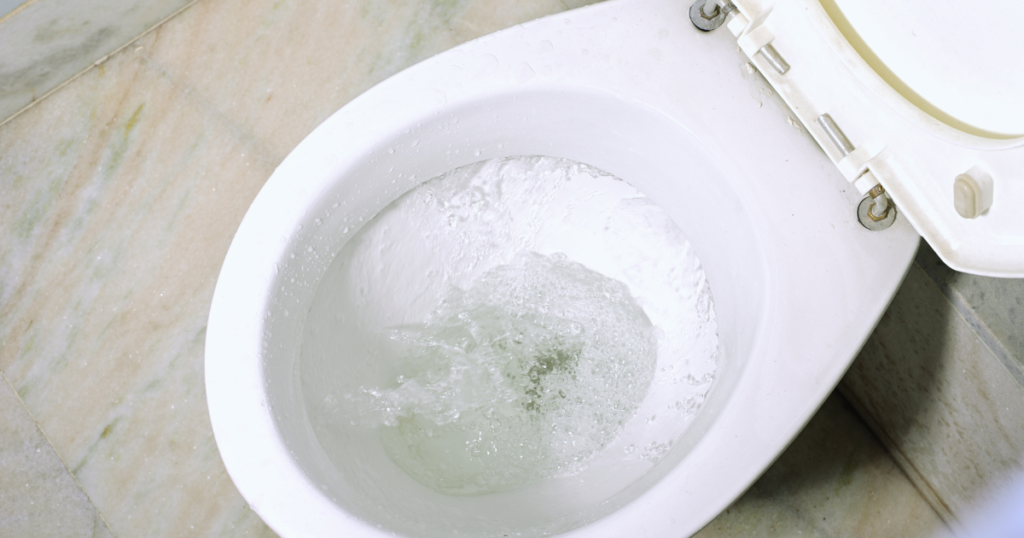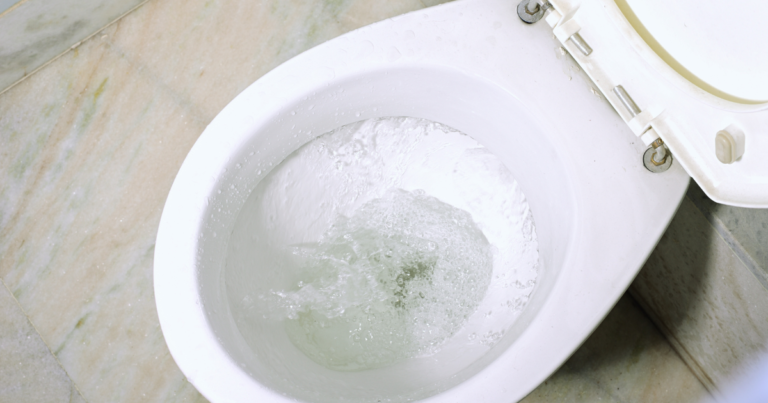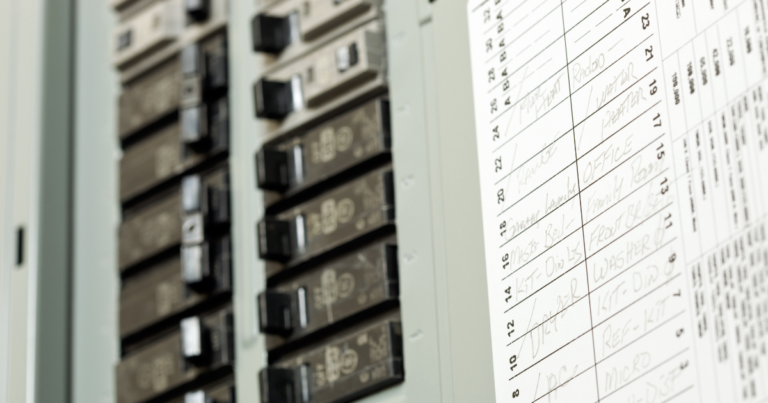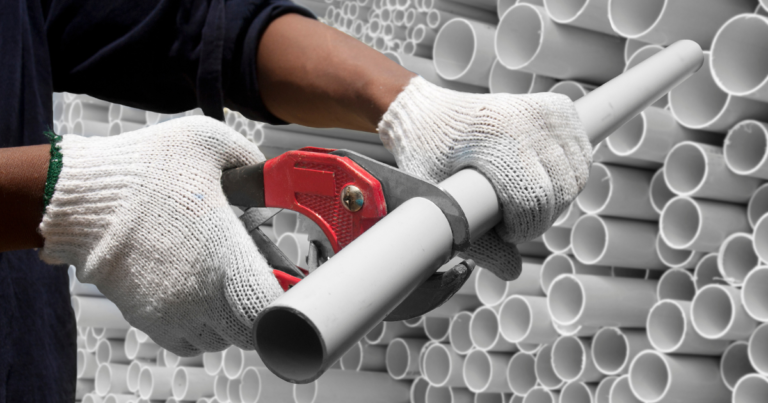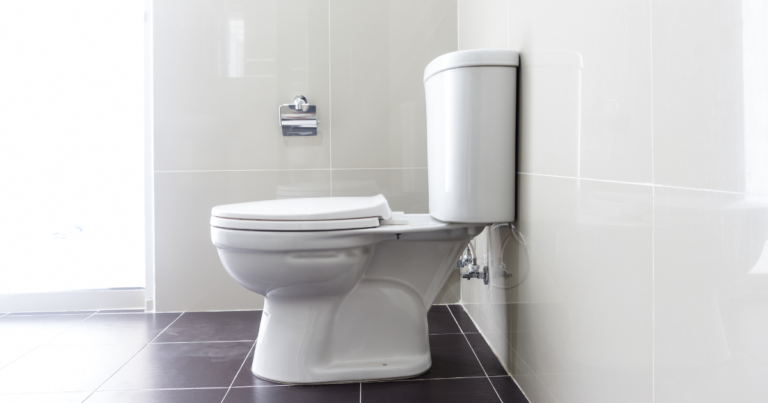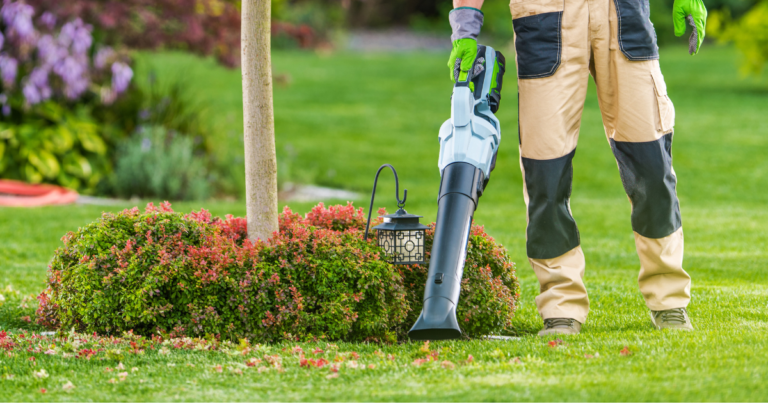Knowing how to stop a toilet from running is a quick and simple process. You don’t need any special tools, and replacement parts are inexpensive. If you are not a diy, hands on type you can still fix a running toilet yourself. Follow the process in this article instead of paying an expensive plumber.
There is a chance that after you try all the options in this article, your toilet is at a point that it needs to be replaced. You will know this after you fix it and another problem comes back a little later.
The good news is changing a toilet is not difficult. Take a look at this article on How To Install A Toilet By Yourself. I walk you through the steps on switching out your toilet yourself. This is another project that isn’t complicated.

Toilet Runs After Flush
The reason for this is the flush valve is not going back down after the flush. There can be more than one reason for this, but they are easy to find.

Toilet Runs Constantly
This happens when the float is sitting higher than the overflow pipe. If the float is unable to do its job properly, it will not turn the water supply off.

Toilet Runs Randomly
This symptom happens because the flapper/flush valve gasket is faulty. There are more than one reason for this, and there are more than one solutions to this.
Parts Of A Toilet

There are more than one type of toilet out there. They all have similar parts, and work basically the same way. Once you understand the components that make a toilet work, you will understand more about how they may fail and cause the toilet to run. Most of the parts below are in every toilet style. The flapper and fill valve gasket serve similar functions but are different parts. And the other parts can look different but have the same functions.

Fill Valve
The fill valve is a vertical pipe with a valve at the top. It regulates the water flowing into the tank. It is designed to shut the water off when the float gets to a certain height.
Float
The float is a piece that rises with the water level. As it reaches a certain height it shuts off the water flowing out of the fill valve. The height of the water level can be adjusted by raising or lowering the float.
Float Adjustment
All floats have a way to adjust them. The floats on a newer fill valve generally have an adjustment screw. If turned to one direction it raises the float height, and the other direction lowers it. If your float is the type that is connected to a metal rod you will grip the rod with both hands, and bend it in the direction you want it to go.
Overflow Pipe
The overflow pipe is a requirement for all toilets. In the event of the fill valve malfunctioning, the overflow pipe transfers water to the toilet bowl instead of overflowing the tank. The height of this pipe should be below the tank rim. The water level height should be between one quarter of an inch and one inch below the top of the overflow pipe.
Flapper
The flapper is a rubber piece that is connected at the base of the overflow pipe. It is used for some toilet designs to create a watertight seal in the opening of the bottom of the tank. It is connected with a chain to the handle, which raises the flapper whenever the toilet is flushed.
Flush Valve Gasket
The flush valve gasket is a piece that has a similar function to a flapper, but on a different toilet design. Flush valves are a more compact stack that the gasket goes around, unlike a flapper that is offset.
Handle
The handle is the portion of a toilet that we use to flush when necessary. Inside the tank the handle is connected to the flapper or flush valve with a chain.
The Contractor Search Guide walks you through the steps of finding a reliable contractor. Some projects require a professional to complete it. This guide:
- Shows you where to look for a reliable contractor for your project.
- Gives you a complete list of interview questions and what you should think about their answers.
- Explains the parts of a contract, and how to draft up the best one for your job.
If your home remodel project needs a contractor this guide will help you find the best one. You may need help with part, or all of your project. Either way The Contractor Search Guide will walk you through all the steps of finding and hiring a reliable contractor. Click the button below to get your copy today!
Toilet Keeps Running Randomly
There are a handful of reasons why a toilet keeps running randomly. You can narrow the investigation to a few key parts. All of these parts will be located in the toilet tank. This is the rectangular portion that is closest to the wall and higher than the bowl. Begin by taking the lid off the tank.
Inside the tank are several parts designed to work together. If one of these parts stop working right it may be the reason for the toilet running. Let’s take a look at the different parts of a toilet, and what their functions are. This can help you understand what you are looking for.
Toilet Runs Constantly
The number one reason why a toilet runs constantly is because the float is set at a higher level than the top of the overflow pipe. This causes the water to spill into the bowl, keeping the water flowing and not shutting off. The fix for this is simple and does not need replacement parts.
The solution to this problem is to adjust the height of the float so that the water level in the tank is below the top of the overflow pipe. The way to do this depends on the style of float your toilet uses. You want the water level to sit ¼ to 1 inch below the top of the overflow pipe.
If it’s a ball float you can adjust the height with your hands. Grip the bar holding the float with both hands and bend the side closer to the float towards the ground. Flush the toilet and check the water height to verify you have it at a good position.
The other type of float adjustment has a thumb screw facing up. You can turn it by hand to lower the float. If you have trouble turning it by hand you can use a screwdriver.
Toilet Keeps Running After Flush
This happens because the flapper or flush valve is not going down at the right time after the flush. This could be because the chain is twisted or kinking. Take the chain off the handle and straighten it out.
If the flapper is the issue you may need to change the flush assembly.
How To Stop a Running Toilet in Seconds
The first thing you can check is if the flapper or the flush gasket has some sort of buildup. Over time a film can form on the surfaces of the tank. If this film is on the flapper or gasket it can cause the toilet to run.
To check this, reach your hand in the tank and lift the flapper/gasket. Wipe off around the base of the flapper as best you can. Do the same thing to the surface that the flapper sits on when resting.
You want to feel the condition of the flapper or gasket to see if it is brittle or cracked. If so it is time to replace it. This is a simple process that is outlined in the video above.
This is a common possibility that causes a toilet to run. It should be the first thing you check, because it is a simple solution to the problem. If this isn’t the issue you can move onto the next step of finding the problem.
How To Fix A Running Toilet
One way to diagnose the problem is when the toilet is running you can wiggle the handle. If this causes the problem to stop, chances are the flush valve or overflow assembly needs to be replaced (depending on the type of toilet you have). When you lift the lid, check if the chain connecting the handle to the flush valve is straight and not kinked.
If you notice there are signs of the flapper or flush valve gasket in bad condition, you should change this.
This can be done by removing the tank from the bowl via the two connection screws. You can either take the assembly off and bring it to the hardware store to purchase a new one, or you can take a picture and bring that with you. Write down the brand of the toilet as well, and try to match that to the part you get.
There is also a chance that the float is positioned too high. This would cause the water level to be higher than the overflow pipe. This will cause water to spill into the toilet bowl constantly. Fix this problem by bending the arm that holds the float downward. This should lower the water level to a reasonable height.
How To Fix A Running Toilet With A Button Flush
A toilet with a button flush has different parts than the toilets listed above, but they work the same way. You will want to troubleshoot in a similar fashion as above, and work on the necessary parts.
If you need to change any parts, aim at purchasing parts by the same manufacturer as your toilet, or ones that are compatible with your brand.
Frequently Asked Questions
How do you fix a toilet that keeps running?
The main cause for this problem is the float is at a level that is too high to shut off the water before it flows into the bowl. The steps to fix this problem are listed above in the section titled Toilet Runs Constantly.
What are the most common causes of a running toilet?
One common cause that causes a toilet to run is a film that has covered the flapper. If enough of this film covers the underside of it, there will be water that runs from the tank to the bowl. This is simple to fix and needs no new parts. Another common issue is the flapper is old and brittle. The cracks in it will cause the water to run as well. This requires a new flapper to be installed.
Why won’t the water stop running into my toilet?
There are several reasons why the water is running in your toilet. They are outlined above. You may want to go through the process outlined in this article to troubleshoot the problem and fix the issue.
Why is my toilet running after I flush?
The toilet runs after the flush because the flapper or flush valve is stuck in an up position longer than it should after the flush. The solution to this is listed above in the section titled Toilet Keeps Running After Flush. Follow these steps to troubleshoot and solve the issue.
Is it bad if my toilet keeps running?
A running toilet can be a sign of a larger issue. You will want to fix the problem in order to save money on your water bill if nothing else. Fixing the issue doesn’t take long, and most likely isn’t expensive. Start at the top of this article and follow the steps to fixing the issue to this problem.
Conclusion
Stopping a toilet from running isn’t difficult. It is a quick fix that is easy to troubleshoot. If you follow along with this article, you will solve the problem of having a running toilet. I hope this article helped.
Thank you for reading this article. Here at Castle Remodel I am dedicated to helping you build your castle.
You got this,
Kevin

